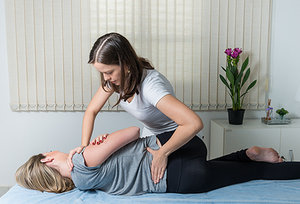Avoid Surgery With Chiropractic
By Editorial Staff
Low back pain is common, but how it's treated varies considerably. Unfortunately, too many people skip chiropractic when they could be enjoying the proven benefits – and avoiding the risks associated with pain medication; or even worse, back surgery.
The authors of a new study hypothesized that adult patients with newly diagnosed lumbar disc herniation or lumbosacral radiculopathy (both of which are common causes of low back pain) who received chiropractic spinal manipulative therapy would be less likely to ultimately undergo
lumbar discectomy (a surgical procedure) compared to similarly diagnosed adults receiving non-chiropractic care.
The study population, drawn from a 101-million-patient U.S. health records network, included adults ages 18-49 with lumbar disc herniation or lumbosacral radiculopathy. Exclusionary diagnoses – reasons for not including a patient in the study – included prior lumbar surgery, absolute indications for surgery, trauma, spondylolisthesis and scoliosis.
Ultimately, more than 11,000 patient records were analyzed, yielding two equivalently sized study cohorts (5,785 apiece) based on whether patients had received chiropractic spinal manipulative therapy vs. other types of care.
 Patients receiving CSMT were significantly less likely to undergo discectomy at both one- and two-year follow-up compared with patients receiving other care. Potential confounding variables associated with an increased likelihood of lumbar surgery, such as older age, gender (male), obesity, history of lumbar injections, prior treatment with opioids or prescription pain medication, etc., were accounted for by the study authors.
Patients receiving CSMT were significantly less likely to undergo discectomy at both one- and two-year follow-up compared with patients receiving other care. Potential confounding variables associated with an increased likelihood of lumbar surgery, such as older age, gender (male), obesity, history of lumbar injections, prior treatment with opioids or prescription pain medication, etc., were accounted for by the study authors.
Commenting on their findings in BMJ Open, the study authors made the significance of the results clear: "Considering the current study excluded absolute indications for surgery and serious pathology, we suggest our findings may be explained by pain relief afforded by CSMT. Previous studies have shown that LDH/LSR have good prognosis with at least half of patients experiencing significant relief in the first 3-12 months. As most patients will undergo surgery within 2-12 months of symptom onset, we suggest initial pain relief afforded by CSMT could allow patients to avoid surgery during this early critical period."

